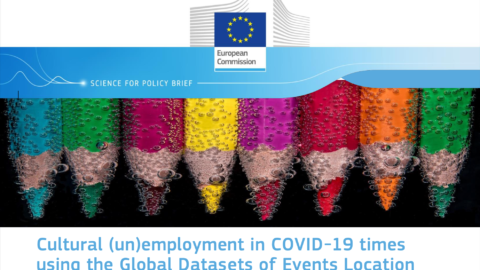In this brief, authors utilise a freely available dataset called the Global Dataset of Events, Location, and Tone (GDELT), an open, big data platform of meta-information extracted from broadcast, print, and web news collected worldwide and translated nearly in real-time into English from over 65 different languages, to analyse the effect of the COVID-19 pandemic on the media coverage of the ‘cultural (un)employment’ topic across 28 European countries (27 Member States plus UK) along two dimensions: article quantity (or popularity) and sentiment. We refine the analysis by focusing on connected topics that may drive the observed results, such as a general concern (or negative sentiment) towards unemployment in the overall economy.
Cultural (un)employment in COVID-19 times using the Global Datasets of Events Location and Tone highlights:
- The Cultural and Creative Sectors (CCS) have been among the first to be negatively affected by the COVID-19 pandemic. Venue-based sub-sectors such as the performing arts were severely hit. Also, the crisis has highlighted the very vulnerable position of many non- standard cultural workers, such as freelancers or temporary workers.
- We find that the (un)employment topic became much more popular with the outspread of the pandemic, while the popularity of culture-related topics considerably decreased.
- On the contrary, both topics register a big drop when it comes to the articles’ tone.
- The general concern generated by the pandemic towards the sustainability of CCS, as proxied by the negative tone of the news under analysis, has pushed some EU Member States to design ad hoc policy measures to support artistic careers.
